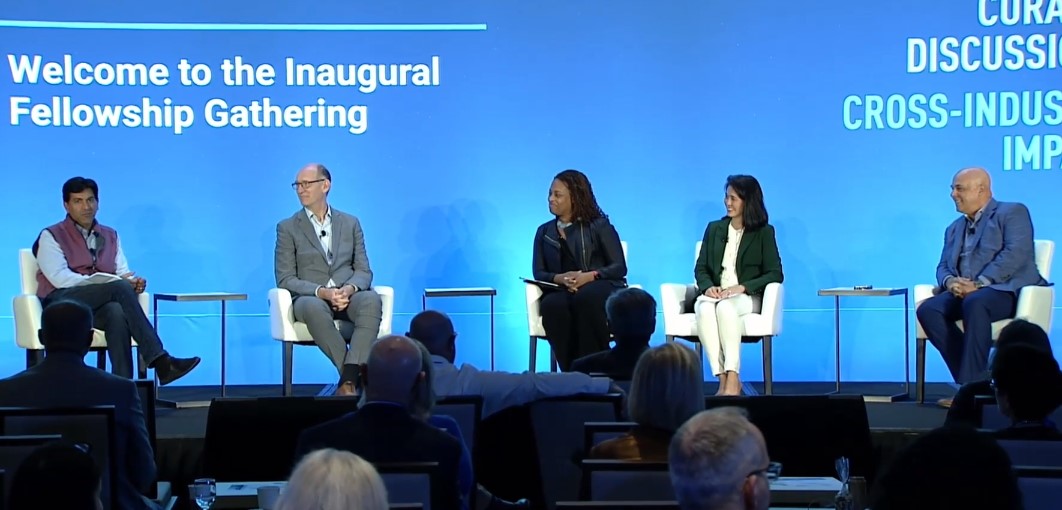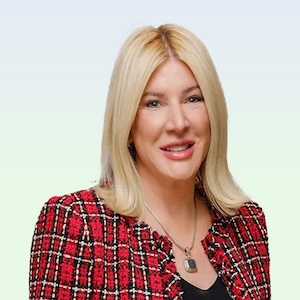The Health Evolution Forum hosted it’s first in-person cross-convening of Roundtable and Work Group Fellows during the 2022 Health Evolution Summit to advance the work each is undertaking, cross-pollinate ideas and make progress on a range of initiatives.
“This is an opportunity to set the leadership agenda for the year ahead,” said Caleb Flint, VP & COO, Forum, Health Evolution. “The focus of the Forum is to help everyone come together to act and really drive impact.”
To help CEOs and executive teams develop that leadership agenda, the convening of Fellows included the following discussions:
- Primary Care & Beyond: Moving Meaningfully Upstream and Integrating Behavioral Health
- The Future of Risk: Applying Lessons Learned in MA to Commercial Populations
- From Pilot to Scale: Defining the Business Model for Digital Health and Home-based Care Models
- Bias In, Bias Out: Addressing Equity Across the Data Pipeline
This article both includes high-level takeaways from the above discussions and begins a series that will examine each of the topics more closely.
Primary Care & Beyond: Moving Meaningfully Upstream and Integrating Behavioral Health
The first session brought together the Health Evolution Forum Work Group on Reinventing Primary Care and Preventative Care Models, Work Group on Building Scalable Models and Community Partnerships to Address Social Determinants of Health as well as a new Roundtable on Mental and Behavioral Health.
Read all of our 2022 Summit articles
Moderated by Gaurov Dayal, MD, President & COO, Everside Health and a Co-Chair of the Workgroup on Reinventing Primary Care and Preventative Care Models, the discussion included Mandy Cohen, MD, EVP & CEO, Aledade Care Solutions; former Secretary, North Carolina Department of Health and Human Services and Co-Chair of the Roundtable on Community Health and Advancing Health Equity; Sachin Jain, MD, President & CEO, SCAN Group & Health Plan and Co-Chair of the Workgroup on Reinventing Primary Care and Preventative Care Models; Steppe Mette, MD, CEO, University of Arkansas for Medical Sciences Medical Center and Co-Chair of the Work Group on Building Scalable Models and Community Partnerships to Address Social Determinants of Health; and Patrice Harris, MD, Co-Founder and CEO, eMed; former President, AMA.
Dayal began the discussion by asking two polling questions of the health system, health plan and life science CEOs participating on whether they agree with the following statements:
- Health care organizations should expand beyond traditional roles to address drivers of health.
- Health care organizations’ investments or initiatives to address drivers of health have made a meaningful impact in improving outcomes.
“The vast majority of us agree that there is a need to expand but only 20 percent of us believe that we’ve actually made a significant impact,” Dayal said of the live polling results.
Among the key directions the panel was driving organizations to expand in is integrating behavioral and mental health with primary care services.
“To that end, we are announcing today a new Roundtable on Mental and Behavioral Health as part of the Fellowship.” Harris said.
The Roundtable plans to host focused conversations about solutions from cross-sector leaders in health care with the intent of then making those solutions actionable. The new Roundtable will start by considering accountability in care, evidence-based and collaborative care models and it will coordinate with other Health Evolution Roundtables.
“One of the many great things I expect to come out of this are ways to make sure we can operationalize the integration of behavioral health into primary care,” Harris said.
Read the full article: How mental health care and social determinants intersect
The Future of Risk: Applying Lessons Learned in MA to Commercial Populations
In the second session, representatives from the Roundtable on New Models of Care Delivery and the Work Group on Leveraging Value-Based Payments to Increase Health Care Value and Resilience, agreed that some of the ideas underlying Medicare Advantage should be applied to the commercial market and discussed a number of barriers to doing so.
Patrick Conway, MD, CEO of Care Solutions at Optum and a Co-Chair of the Roundtable on New Models of Care Delivery, led the discussion including Christopher Chen, MD, CEO, ChenMed; Krista Hoglund, CEO, Security Health Plan; and Brian Pieninck, President & CEO, CareFirst BlueCross BlueShield and a Co-Chair of the Work Group on Leveraging Value-Based Payments to Increase Health Care Value and Resilience.
Conway asked Fellows in the audience to rank the greatest barriers to growing commercial two-sided risk in their organization or market. The results:
- Fragmented purchasers
- No consistent contract standards
- Other
- Unable to translate MA clinical models to commercial
- Restrictive state or federal policy
Those are not the only barriers to value-based care, of course. “Two barriers to moving to commercial risk that are not on the list are the supply chain challenge with people who know how to take risk, especially providers, and the reality that if you can make commercial risk work you’re talking about a lower premium so you’re going to have a lower potential margin,” Chen said.
Conway added: “The question for us is how do we shift the overall health system so we’re focused on value and risk across Medicare, Medicaid and commercial?”
Policy will be critical to achieving that. Pieninck explained that until recently, for example, Maryland health care organizations could not implement full capitation models or enter into two-sided risk arrangements. After a two-year endeavor to change the law, the bill championed by CareFirst just passed the state legislature. Pieninck noted this as one example of organizations, including AHIP, Blue Cross Blue Shield Association, CareFirst and others working together to influence meaningful policy change.
“The Health Evolution value-based care work group is launching a cohort study specifically for the commercial market,” Pieninck said. “We’re looking for participants on both the payer and provider side. The cohort will get underway in August or September of 2022.”
Executives interested in learning more about the VBP Cohort Study can learn more here.
Read the full article: Applying lessons learned in Medicare Advantage to commercial populations
From Pilot to Scale: Defining the Business Model for Digital Health and Home-based Care Models
Co-Chairs of the Work Groups on Advancing Innovative Home-based Care Models and Digital Health and App Experience joined together for the third discussion.
Steve Udvarhelyi, MD, President & CEO, Blue Cross and Blue Shield of Louisiana and a Co-Chair of the Roundtable on Next Generation IT in Health Care, served as the facilitator along with Nancy Howell Agee, President & CEO, Carilion Clinic and a Co-Chair of the Work Group on Digital Health and App Experience; Aaron Martin, VP Health, Amazon, and a Co-Chair of the Work Group on Digital Health and App Experience; Hal Paz, MD, EVP for Health Sciences, Stony Brook University & CEO, Stony Brook University Medicine and a Co-Chair of the Workgroup on Advancing Innovative Care Models; and Mona Siddiqui, MD, SVP, Clinical Strategy and Quality, Enterprise Clinical Management, Humana and a Co-Chair of the Workgroup on Advancing Innovative Care Models.
Like the other discussion leaders, Udvarhelyi posed a pair of questions to all participants in the audience to gauge the top reason for their organization’s interest in home based care models, and in digital health solutions. The respondents chose between: patient convenience and access, value-based care, workforce capacity, market share and other.
“The number one driver is patient convenience and access,” Udvarhelyi noted. “I would just say my own personal belief is that convenience and meeting the patient where they are is not something those of us in health care have historically done well. We need to be careful that we don’t get disrupted and figure that out quickly.”
Determining how to move beyond pilot programs requires establishing trust, overcoming interoperability barriers, deploying models in populations where they can be effective, communicating the value of pilot programs and ultimately earning engagement and alignment across the health care system, the executives said.
As CEOs and other leaders establish a road map for adoption of digital solutions, “there are spaces where we as an industry are not doing enough or don’t have the tools to provide what’s needed and there are spaces that are evidence-based and we know to be effective, where there is an impact on total cost of care,” Siddiqui noted. “What we need is a capability to do rapid tests and the ability to pivot messaging, channel strategy and engagement approaches based on what we are learning in as close to real time as possible. That’s where health care overall has to move.”
Read the full article: Moving from pilot to scale in digital health and home-based models of care
Bias In, Bias Out: Addressing Equity Across the Data Pipeline
“What can we do to build more trust in the release of information for purposes of developing products?” That was the premise with which Aneesh Chopra, President, CareJourney and a Co-Chair of the Work Group on Governance and Use of Patient Data in Health IT Products, kicked off the final session of the inaugural cross-Forum convening.
To address that question, the discussion brought together the Work Groups on Leveraging Data to Improve Health Equity and Governance and Use of Patient Data in Health IT Products.
Chopra moderated the discussion with Pat Geraghty, President & CEO, GuideWell & Florida Blue and a Co-Chair of the Roundtable on Community Health and Advancing Health Equity; Cris Ross, CIO, Mayo Clinic and a Co-Chair of the Work Group on Governance and Use of Patient Data in Health IT Products; Phoebe Yang, General Manager, Amazon Web Services Healthcare; and Laurie Zephyrin, MD, VP Advancing Health Equity, The Commonwealth Fund and a Co-Chair of the Work Group on Leveraging Data to Improve Health Equity.
“Data in and of itself will not advance equity. But we don’t know what we don’t know so we have to measure what we value,” said Zephyrin.
As important as it is to have the data it’s also critical to think beyond the data, Zephyrin added, to avoid existing biases having undue influence on how we interpret data.
“The Health Evolution Work Group on Leveraging Data to Improve Health Equity has created a playbook, so to speak, to really help others walk through how to think about data and data disaggregation,” Zephyrin said. “It’s the Health Equity Pledge that approximately 50 health systems and health plans have signed to create a collective community committing to collect data on equity and also committing to start those processes within their institutions because obviously it’s a heavy lift. It’s not something that you can do in one day, but it’s important to start somewhere.”
Guidewell & Florida Blue is one such signatory of the Health Equity Pledge.
“We made the Pledge — and it’s across business lines so that you don’t just do it all in the one segment where it’s easiest,” Geraghty said.
Executives and organizations Interested in participating in the Health Equity Pledge can learn more here.
On the data front, as more organizations consider joining data sharing partnerships, the need for industry guidelines for navigating the use of de-identified data sets is increasingly important. As such, Fellows are also looking for feedback on the first draft of the Trust Framework for Accelerating Responsible Use of De-identified data in Algorithm Development. Learn more here.
Editor’s note: As explained above this is the first in a series of articles that will explore each topic in more depth. Look for those in the Insider digital publication, on our homepage or check back here as we will link to them upon publication.










